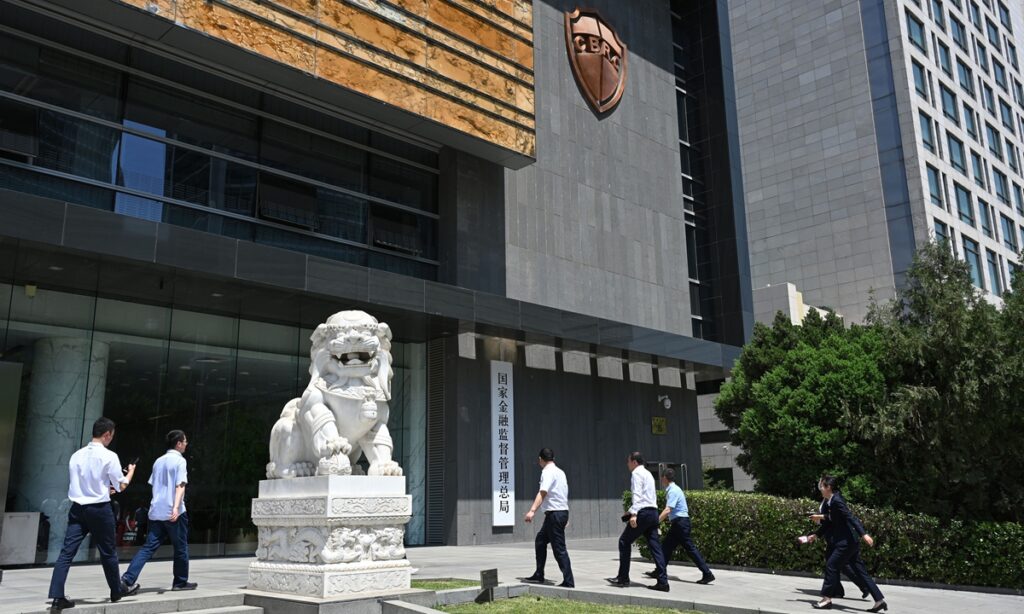Move aimed at closing loopholes, not targeting specific firms: analysts
The establishment of the National Financial Regulatory Administration (NFRA) is aimed at closing regulatory loopholes and ensuring sound development of the country’s vast financial industry, and is not targeting specific companies, as some foreign media outlets have claimed, industry analysts noted.
On Thursday morning, a ceremony was held in Beijing to mark the inauguration of the NFRA, marking the start of a new phase in China’s financial regulation that has evolved over the years to tackle challenges at different development stages. The new administration, which is directly under the State Council, the cabinet, is in charge of regulating the entire financial industry, with the exception of the securities industry. It was formed on the basis of the China Banking and Insurance Regulatory Commission, which has been in operation for five years.
Roughly a week before the inauguration, Li Yunze, a veteran banker and former vice governor of Southwest China’s Sichuan Province, was appointed to lead the NFRA on May 10.
“It has been just a little over two months between the announcement in March and the inauguration today, which reflects the country’s efficiency and resolve in financial reform,” Dong Shaopeng, a senior research fellow at the Chongyang Institute for Financial Studies at the Renmin University of China, told the Global Times on Thursday.
The establishment of the NFRA was adopted by the National People’s Congress, the top legislature, during the annual two sessions in March, as part of a sweeping institutional reform plan, which also included the restructuring of the Ministry of Science and Technology (MST). Bolstering self-reliance in science and technology and preventing major systemic financial risks have been among the top priorities for Chinese officials.
In terms of tackling financial risks, the NFRA will take charge of all financial regulation except the securities sector, which avoids previous problems such as regulatory loopholes or overlaps, Liu Xiaolei, professor of Finance and Accounting from the Guanghua School of Management, Peking University, told the Global Times on Thursday.
The NFRA also takes over certain functions of the People’s Bank of China (PBC), the central bank, and the China Securities Regulatory Commission (CSRC), making clear the specific responsibilities of the three top financial regulatory bodies. The NFRA will be in charge of financial regulation and consumer and investor protection, the PBC will focus on monetary policy and macroprudential supervision, while the CSRC will focus on the securities sector.
“This is also a chance to promote the improvement of the local financial supervision system, establish a central and local financial supervision coordination mechanism, and better prevent and resolve regional and systemic financial risks,” Dong Ximiao, chief researcher at the Merchants Union Consumer Finance Co, told the Global Times.
Renewed alarm
While the plan for the establishment of the NFRA has long been in the making, recent banking crises in the US and Europe, particularly the failure of several US regional banks, also highlighted the need to strengthen regulation, analysts noted.
“Recently, a series of bank [failures] represented by [failed] Silicon Valley Bank in the US has once again sounded the alarm of financial systemic crisis, and supervision for the financial industry must be strengthened,” Liu said, stressing that preventing systemic financial risks is also crucial to ensuring financial support for the development of the real economy.
In a report released on Monday, the PBC also said that while the failure of Silicon Valley Bank had a limited impact on China’s financial system, it also offered several “enlightenments,” including avoiding sudden shifts in monetary policy and strengthening regulation on small- and medium-sized financial institutions.
As China has been taking concrete steps to prevent systemic financial risks and secure the development of the world’s second-largest economy, certain foreign media outlets and foreign pundits have been painting the steps as “tightening controls” in an apparent attempt to smear China’s business environment. Foreign media outlets in particular have been hyping Chinese national security and other authorities’ recent law enforcement action against consultancy Capvision, with some calling the move “a crackdown” that sends “jitters across foreign businesses.”
Financial consultancy also falls under the regulation of the NFRA, and if certain institutions continue to carry out illegal acts in China, “then we have the right to deal with them in accordance with the law,” Dong Shaopeng said.
However, Dong Shaopeng stressed that such regulatory actions do not target specific entities or countries.
“These unfriendly forces in foreign countries will make various malicious interpretations of any Chinese policy. But China’s policy coordinates development and security, and will not target any specific institution or country,” he said.




